- Home
- Lin Oliver
Always Dance with a Hairy Buffalo
Always Dance with a Hairy Buffalo Read online
To Indya Belle and Ace, who light up the world.
And to Stacey, always. —H.W.
For Leo Pasquale Confalone, darling baby boy.
—L.O.
CONTENTS
TITLE PAGE
DEDICATION
CHAPTER 1
CHAPTER 2
CHAPTER 3
CHAPTER 4
CHAPTER 5
CHAPTER 6
CHAPTER 7
CHAPTER 8
CHAPTER 9
CHAPTER 10
CHAPTER 11
CHAPTER 12
CHAPTER 13
PREVIEW
ABOUT THE AUTHOR
ALSO AVAILABLE
COPYRIGHT
“I have two left feet,” Billy Broccoli announced at the dinner table one rainy March evening.
“Don’t leave out your twelve thumbs and six pair of eyes,” his stepsister, Breeze, said, laughing so hard she nearly spit a wad of mashed potatoes back onto her plate.
“I’m not trying to be funny, Breeze,” Billy complained. “This is a serious problem, and I’d appreciate a little understanding.”
Billy’s stepfather, Bennett Fielding, put down his fork and placed one elbow on the kitchen table. Billy knew what was coming. This was Bennett’s typical pose when he was about to go off on a long, boring explanation, usually involving teeth or some aspect of dental health. He was a very devoted dentist.
“Scientifically speaking,” Dr. Fielding began, “the odds of any human having two left feet are extremely rare. But then, nature is full of amazing surprises. For instance, take your lowly snail. Its mouth is no larger than the head of a pin, yet snails can have up to twenty-five thousand teeth.”
“And that fits into this conversation exactly how, Dad?” Breeze asked.
“I’m just saying, Breezy, that if Billy actually did have two left feet, it would be worthy of going into the Guinness Book of World Records.”
Billy’s mother, Charlotte Broccoli-Fielding, poured herself another glass of lemonade from the pitcher on the table. She was known for making some of the best lemonade in all of Los Angeles. Being the principal of Billy and Breeze’s middle school, she was also known for understanding what middle schoolers were trying to say even when they weren’t saying it very well.
“I think what Billy means, Bennett, is that he has trouble dancing,” she explained.
“Exactly, Mom!” Billy shouted, relieved that someone finally understood what his actual problem was. “When I try to dance, it’s like my feet go in opposite directions. One goes to Oregon. The other goes to Argentina.”
“As long as your feet stop stinking up the house, I don’t care where they go,” Breeze muttered.
“For your information,” Billy said, a little offended. “My feet do not smell. I make it a habit to change my socks at least once a week. And if I don’t, I’m careful to place my socks by an open window to air out overnight.”
Breeze made a gagging sound. “Eeuuuww,” was the only syllable she could utter.
“Maybe it’s time you changed your socks every day, honey,” Mrs. Broccoli-Fielding suggested gently, putting a supportive hand on Billy’s arm. “When you become a tween, you have to step up your grooming a notch.”
“Or in Billy’s case, twenty notches,” Breeze added.
“People, this is not helping me with my problem.” Billy pushed his half-eaten meatballs and mashed potatoes away, to emphasize the point that he was trying to have a serious conversation. “I have to learn a traditional Native American dance by the end of the week, and I can’t do it. As I was saying before I was so rudely interrupted by a certain thirteen-year-old named Breeze Fielding, I have two left feet.”
“Is it a complicated dance?” Mrs. Broccoli-Fielding asked.
“It is for me. I can’t remember what comes after what.”
“I have a suggestion,” Bennett said. “You could put down individual pieces of paper on the rug and use them to create a chart of where your feet should go. It’s like reading for your feet.”
He sat back in his chair and smiled, very pleased with himself for coming up with this great idea. Bennett often came up with unique solutions to problems, like when he decided to use his cell phone case clipped on his belt to hold his dental floss. He proudly demonstrated that little invention to all his dental patients for weeks afterward. Billy felt bad about having to burst his bubble on his “reading for feet” concept.
“Making that chart would take forever, Bennett, and I have to know this dance soon. We’re demonstrating how the Chumash tribe celebrated, and our dance has to be perfect by Friday night.”
“Oh, now I understand,” Billy’s mom said. “You’re performing for the Native American Night celebration at the Natural History Museum.” Noticing the puzzled look on Bennett’s face, she added, “Every year, our school does a unit on Native American culture, and the final performance is at the museum. The teachers tell me that this year, all the parents are attending. We’re expecting a big crowd.”
Billy’s stomach did a flip-flop that had nothing to do with the meatballs or the mashed potatoes. It was sheer, raw nervousness.
“You’re making it worse, Mom,” he said. “Thinking about all those people watching me makes me absolutely one hundred percent sure I’m going to totally mess up.”
“Nonsense. You’ll be great, honey. Everything you do is great.”
“Oh yeah?” Billy got up from the table and started to pace around the kitchen. “That’s not what Ruby Baker said. She’s my partner and she said I was stepping all over her feet. Today she was wearing sneakers, but on Friday, she’ll be wearing moccasins. One mistake and I could crush her big toe. And all the little ones, too.”
“What you need is a private dance instructor,” Breeze said, gathering the plates from the table. “Someone cool, a great dancer, who can really show you the moves.”
“Did someone call?” said a ghostly voice from the kitchen doorway. “I happen to be the move master. When I glide across the dance floor, I’ve literally seen women faint.”
It was Hoover Porterhouse III, who had just come in from his evening float around the neighborhood. Of course, he was only visible to Billy, as he was Billy’s personal ghost. But like all ghosts, Hoover left a trail of cold air wherever he went. Breeze shivered.
“Billy,” she said, zipping up her hoodie. “Don’t you think it’s weird that half the time I’m around you, I’m freezing cold? Are you a ghost or something?”
Billy forced himself to laugh, much too loud and much too long for the situation.
“A ghost?” he roared, almost choking on his words. “Are you crazy, Breeze? There’s no such thing as ghosts!”
“You don’t have to laugh like a wild hyena, Billy. It’s creepy. Besides, some people believe in ghosts.”
“Like me, for instance,” the Hoove said, floating over next to Breeze and whispering in her ear. “I’m a big believer.”
Billy wondered if perhaps Breeze was catching on to Hoover’s presence in their house. It had been three months since the day they moved in and Billy first discovered that a fourteen-year-old ghost had been living in his bedroom closet for the last ninety-nine years. Could it be that so many close encounters with the Hoove was making Breeze suspicious? Could she have figured out Billy’s secret? Why else would she make a random ghost comment?
Bennett leaned in, cleared his throat, and put his elbow on the table for the second time.
“Uh-oh,” Breeze whispered to Billy. “Here comes another science lecture.”
“You started it,” Billy whispered back. “You and your ghost talk.”
Bennett had already launched into a long-wind
ed explanation of what might account for people believing in ghosts.
“Sometimes, people hear a strange sound and can’t identify where it’s coming from, or observe an unusual phenomenon that doesn’t present a clear explanation,” he droned. “So they wrongly assume it’s a ghostly presence.”
The Hoove let out a rip-roaring belly laugh.
“Oh yeah! Wrongly assume this presence!” he howled.
He hovered next to the kitchen table and knocked a fork, knife, and spoon off the table. As they clattered to the floor, both Breeze and Billy’s mom let out a startled gasp.
“And here we have a perfect example of what I was talking about,” Bennett continued without missing a beat.
“Are you saying we have a ghost in our kitchen at this very moment?” Breeze asked.
“Exactly the opposite. Billy simply knocked some silverware off the table and it made a noise. No reason to assume we have a ghost.”
“Except that you do have one,” Hoover snickered, reaching up to turn his plaid newsboy cap backward with a confident air. “And, I might add, a perfect specimen of a ghost at that.”
“You wish,” Billy whispered to him.
“No, I don’t,” Breeze answered, thinking Billy was talking to her. “I don’t wish for ghosts. I wish for important things like a new pair of black boots or world peace. Stuff like that.”
The Hoove had grown impatient with the conversation of his nonexistence. He was real. He knew it and Billy knew it, so to him, this was wasting his time.
“Come on, Billy Boy,” he said, tapping him on the shoulder. “You want to learn to dance or not? I’ll meet you in your room and show you some moves. That is, if you can break away from all this dinner table fun and games.”
The Hoove drifted off down the hall toward Billy’s room. Billy picked up his dinner and salad plates and took them over to the kitchen counter.
“May I be excused?” he said as he carefully stacked them in the dishwasher.
“Why? Did you cut the cheese again?” Breeze asked.
“That’s so funny I forgot to laugh,” Billy answered. “I’ll be in my room, and I’d prefer not to be disturbed. I have a lot of dance steps to learn.”
“You do that,” Breeze said. “I can’t wait to see what you do with the Chumash Cha-Cha.”
By the time Billy got to his room, the Hoove had pushed all the furniture to the edges of the walls and tossed Billy’s dirty clothes into the closet.
“I have created a dance floor for our lesson,” he announced. “Every great performer needs a stage. Close the door, Billy Boy. Make yourself comfortable and observe.”
Billy perched on the edge of his bed while the Hoove placed himself smack in the middle of the room. He pulled his plaid cap down over his left eye, snapped his suspenders, and assumed a very theatrical position.
“The key to dancing is all in the sway,” he began, barely rocking his transparent body to and fro. “Never mind all those made-up steps everyone does. They ruin the mood.”
“But, Hoove, the Chumash dances have a lot of steps. Very detailed steps, as a matter of fact. And swaying is not one of them.”
“The trouble with you, Billy Boy, is that you follow the crowd. Remember the Hoove’s Rule Number Five. Never be afraid to do what your smooth self tells you to do.”
The Hoove floated around the made-up dance floor, turning and dipping and swaying to whatever music was in his head.
“Toss me your baseball bat,” he said to Billy as he swept by him.
“Why, are you going to dance your way to first base?”
“I need a partner,” the Hoove said. “And in the absence of a great-looking girl, I will demonstrate with this stick of wood.”
Billy picked up one of the wooden bats that was leaning against the wall and threw it to the Hoove, who snatched it out of the air and held it close to him. To Billy, it looked like the Hoove was dancing with the bat. But to anyone else, it would have looked like the bat was spinning on its own in midair.
“The important thing,” the Hoove pointed out as he two-stepped around the room, “is to move in time with the music.”
“So, Hoove, can I just point out one little thing? There is no music.”
“Don’t get your undies in a bundle over details. And while you’re at it, toss me that other bat.”
Billy did, and once again, the Hoove caught it in midair. Then he picked up Billy’s metal wastebasket and put it on top of the desk. Using the bats as drumsticks and the wastebasket as a drum, he started to beat out a rhythm.
“You want music, there’s your music,” he said. “It’s your basic turkey trot, a classic beat in the dance world.”
“Well, I hate to burst your bubble, Hoove, but the Chumash weren’t exactly turkey trotters. They danced to pay respect to their ancestors. And to thank Mother Earth for the harvest and the heavens for the rain. It had nothing to do with turkeys or trotting. It looked more like this.”
Billy hunched down low to the ground and started to twirl in a small circle, hopping on one foot and then the other. Just as he was starting to get into the rhythm, though, his feet got tangled up into a ball and he fell over onto the rug.
“You see?” Billy moaned. “There’s the proof. I can’t do this.”
“You have to practice. I’ll drum and you do it again. And this time, don’t bend over so far. Your butt is sticking out so far it looks like a landing platform for a helicopter.”
Settling himself down on the top of the desk, the Hoove pounded out a rhythm on the wastebasket. Billy hunched down and started to circle again, this time letting out a loud whoop as he spun round and round. The clatter of the drums combined with Billy’s whoops attracted the spying eye of Rod Brownstone, Billy’s next-door neighbor. He snuck out of his room and crept along the gravel path between their two houses until he came to the window that looked into Billy’s room. Pressing his face up against the glass, Brownstone saw Billy dancing in a circle and two bats floating in midair. His jaw practically came unhinged and dropped to the windowsill.
“I knew it,” he whispered to himself. “Weird things happen inside this house.”
Reaching down to his belt, he grabbed the walkie-talkie that he kept clipped there in case of emergency. As far as Rod Brownstone was concerned, no emergency was too small. He held the walkie-talkie up close to his mouth.
“Dad,” he whispered. “Come in, Dad. Emergency situation existing at 632 Fairview. Over.”
There was static on the other end, and then Rod’s father’s voice could be heard.
“What is it this time, son?”
“Deputy Brownstone reporting two floating bats that are assaulting a wastebasket. I need you here to make an arrest.”
“Arrest who, Rod? A baseball bat?”
“Just get here, Dad. Over and out.”
Rod Brownstone continued to press his face against the window, watching Billy and the Hoove practice the dance. Just as Rod heard his father’s footsteps on the gravel path, Billy collapsed on the floor inside his room, panting for air.
“I can’t breathe,” he gasped. “Those Chumash must have been in great shape. I wonder if they had treadmills back then.”
“Dad, hurry!” Brownstone whispered into the walkie-talkie. “You’re going to miss it.”
Inside, Billy had crawled over to his bed and flopped down, clutching his sides.
“That was harder than the push-ups we do at baseball practice,” he said to the Hoove.
The Hoove put down the bats and floated over to Billy.
“I got to be honest with you, Billy Boy. The dance is not looking good. In fact, it’s looking extremely weak. I hate to break it to you, pal, but no crops are growing because of your dancing.”
“But I didn’t fall down this last time. That’s an improvement, isn’t it?”
“Dancing requires more than staying on your feet. You got to look good, feel the passion, and know the moves. Which means you’re going to need some intensive help
.”
“What does that mean, exactly?”
“That means I am taking the bull by the horns and coming to your school tomorrow. I will be there when you practice with Ruby, to guide your feet and show you the rhythmic way to success. It’s going to be Hoove-tastic.”
“Does it make any difference at all that I don’t want you at my school?”
“Not even a drop. Face it, you need me, Billy Boy. I’ll come to your rehearsal, learn the steps … instantaneously, I might add … give them my unique flair, and finally will pass them on to you, you lucky ducky.”
Billy put his face in his hands and moaned.
“Just let me rest for a minute, okay? Then we can try again.”
“Have it your way. I’ll be relaxing in your closet. We will begin Round Two of instruction after you’ve recovered.”
The Hoove drifted across the room and floated through the door of Billy’s closet, stretching out along the top shelf that used to contain Billy’s sweaters and shoes. Outside, Rod’s father had arrived at the window.
“All right, son, where’s the perpetrator?”
“In there, Dad,” Rod said, pointing into Billy’s room. “Talking to himself.”
Mr. Brownstone looked in the window, and then frowned at his son.
“All I see is a kid lying on his bed. The worst thing he’s doing is covering his face in his hands, which is not at all illegal.”
Rod looked in. He saw Billy on his bed, the bats lying on the desktop, unmoving.
“You’ve done it again, Rod.” His father shook his head. “You’ve taken me away from my favorite TV show and got me out here for nothing.”
“But those bats were floating, Dad. I swear it. Just wait two more minutes, and you’ll see it happen again. I promise.”
Mr. Brownstone made an irritated clicking sound with his tongue.
“Give me that walkie-talkie,” he said, snatching it from Rod’s hands. “I forbid you to use an intelligence device until you know how to use it properly. And that does not involve making up ridiculous stories and spying on good neighbors who are just going about their business.”
Taking Rod by the collar, he guided him firmly away from the window and back to their house. Poor Rod Brownstone had to spend the rest of the evening in his room, writing a paragraph on “Why I Will Not Treat Police Equipment as a Toy and Waste My Father’s Time Again.” As his pencil moved across the paper, Rod Brownstone couldn’t possibly know that across the yard, the baseball bats were at it again.

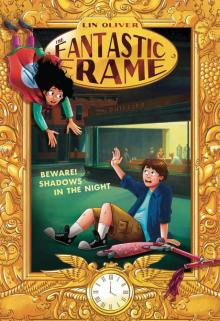 Beware! Shadows in the Night
Beware! Shadows in the Night Almost Identical #1
Almost Identical #1 Two-Faced #2
Two-Faced #2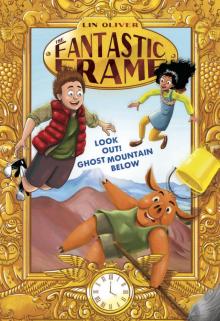 Look Out! Ghost Mountain Below
Look Out! Ghost Mountain Below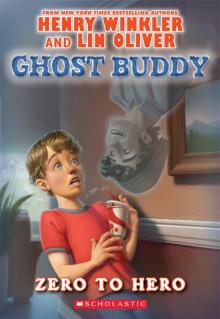 Zero to Hero
Zero to Hero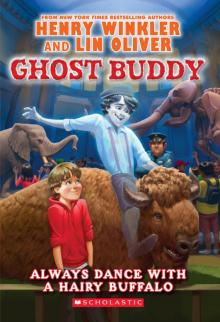 Always Dance with a Hairy Buffalo
Always Dance with a Hairy Buffalo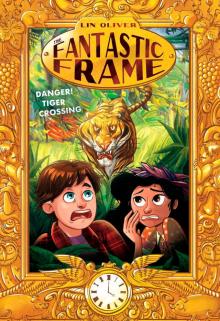 Danger! Tiger Crossing
Danger! Tiger Crossing Twice As Nice
Twice As Nice Double-Crossed
Double-Crossed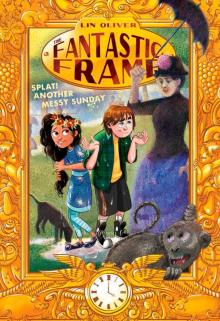 Splat! Another Messy Sunday
Splat! Another Messy Sunday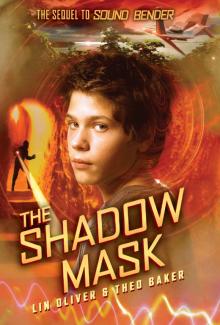 The Shadow Mask
The Shadow Mask